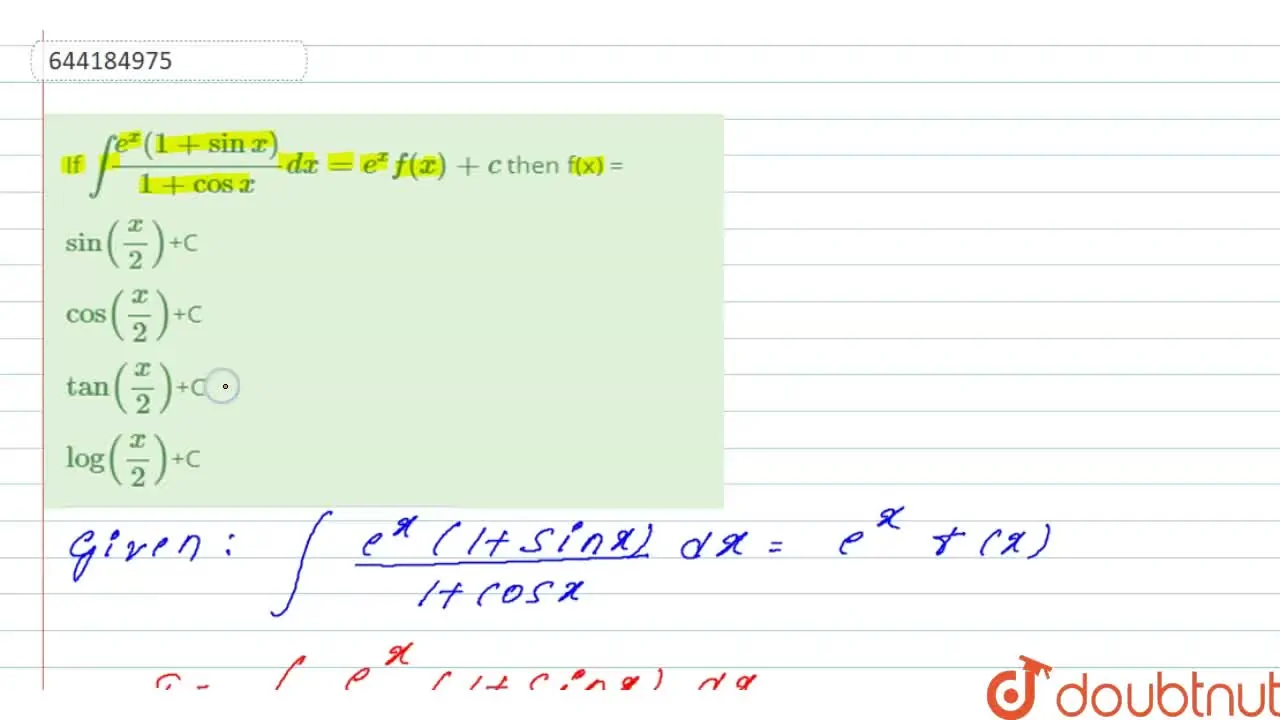If ∫ex(1+sinx)1+cosxdx=exf(x)+c then f(x) =Solution in Kannada
sin(x2)+C
cos(x2)+C
tan(x2)+C
log(x2)+C
The correct Answer is:C
Step by step video, text & image solution for If int (e^(x)(1+sinx))/(1+cosx) dx = e^(x) f(x) + c then f(x) = by Maths experts to help you in doubts & scoring excellent marks in Class 12 exams.
Related Playlists
Similar Questions
The eccentricity of the hyperbola 4x2−9y2=36 is
06:18View Solution2tan−1(−3)=
03:54View SolutionIf int(e^(x)-1)/(e^(x)+1)dx=f(x)+C, then f(x) is equal to
03:44View SolutionStatement-I: ∫exsinxdx=ex2(sinx−cosx)+c
Statement-II: ∫ex(f(x)+f'(x))dx=exf(x)+c02:50View SolutionIf ∫ex(1+sinx)1+cosxdx=exf(x)+c, then the value of f(x) is -
03:37View SolutionIf ∫ex−1ex+1dx=f(x)+c, then f(x)=
View SolutionThe integral I=∫ex(1+sinx1+cosx)dx=exf(x)+C
(where, C is the constant of integration).
Then, the range of y=f(x) (for all x in the domain of f(x)) isView SolutionIf ∫(ex)1−sinx1−cosxdx=f(x) constant, then f(x) is equal to
View SolutionIf ∫ex−1ex+1dx=f(x)+c, then f(x) is equal to
06:11View SolutionI = int e^(x) { f (x) + f' (x) } dx can be found using segmented integration. As I = int e^(x) f (x) + dx + int e^(x) f' (x) dx = int e^(x) dx + e^(x) f (x) - int e^(x) f (x) dx + c = e^(x) f (x) + c And int e^(ax) { f (x) + (f' (x))/(a) }dx = a^(ax) (f(x))/(a) + c int e^(x) (tan^(-1) x + (1)/(1 + x^(2)) ) dx = :
05:05View SolutionI = int e^(x) { f (x) + f' (x) } dx can be found using segmented integration. As I = int e^(x) f (x) + dx + int e^(x) f' (x) dx = int e^(x) dx + e^(x) f (x) - int e^(x) f (x) dx + c = e^(x) f (x) + c And int e^(ax) { f (x) + (f' (x))/(a) }dx = a^(ax) (f(x))/(a) + c int e^(x) (tan x - log cos x ) dx = : int e^(x) ((1 + sin x)/(1 + cos x )) dx = :
03:28View Solution∫ex{f(x)+fl(x)}dx=exf(x)+k
निम्न के लिए सही उत्तर चुनें:
∫ex1+sinx1+cosxdx=02:03View SolutionMethod of integration by parts :
If ∫ex(1+sinx)dx1+cosx=exf(x)+c, then f(x)=03:43View SolutionGiven that ∫ex[f(x)+f′(x)]dx=exf(x)+c. Using the given result evaluate ∫ex(sinx+cosx)dx
07:22View SolutionGiven that ∫ex[f(x)+f′(x)]dx=exf(x)+c. By writing ∫ex(sinx+cosx)dx=∫exsinxdx+∫excosxdx and applying integration by parts in the first integral, evaluate ∫ex(sinx+cosx)dx
05:18View Solution


